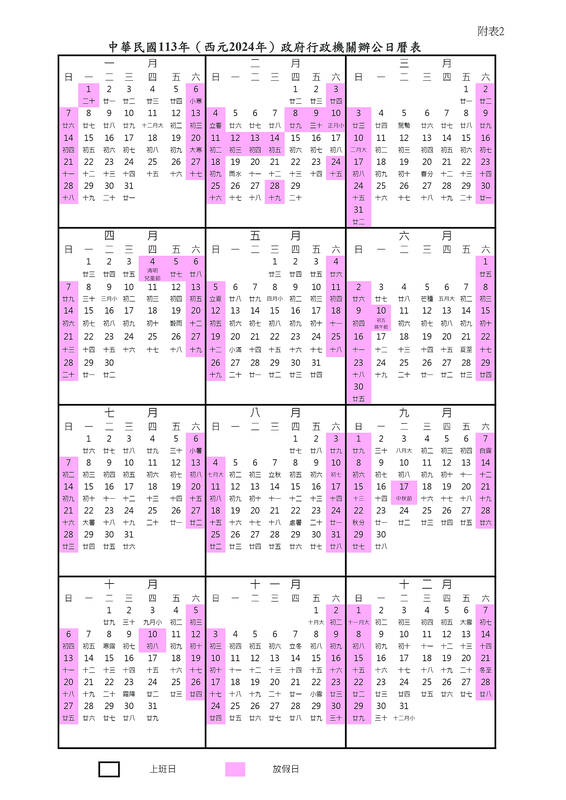The Executive Yuan (EY) yesterday announced the official workday calendar for next year, which includes one makeup day and four holidays with more than three days off.
It also announced new standards for makeup days in the event of consecutive holidays.
The Directorate-General of Personnel Administration cited the importance of the Lunar New Year and Tomb Sweeping holidays to the public as its reason to mandate flexible off-days.

Photo courtesy of the Directorate-General of Personnel Administration
The 115 total off-days dovetail with dates that international financial markets are closed, minimizing the effects of state holidays on stock and currency exchange trading, it said.
Over the next five years, only the calendar for 2026 has not been adjusted, while the other four years would only have one makeup day to account for the holiday on the day before Lunar New Year’s Eve.
The changes came after six makeup days were mandated by the government this year, which drew criticism from the public.
Regarding when the makeup workday should be, the phrasing has been amended to “the Saturday on the week, or the Saturday the week after,” from “the Saturday the week before.”
Next year’s makeup day has been set for Feb. 17, compensating for the Thursday before Lunar New Year’s Eve.
The official workday calendar only applied to civil servants, public officials and employees at state-owned companies, adding that the off-days of military personnel falls under the jurisdiction of the Ministry of National Defense, the agency said.
Schools should observe the academic calendar, which is decided by the Ministry of Education, while the private sector should base off-days on the Labor Standards Act (勞動基準法), it said.
Regarding whether the reduced off-days would affect domestic markets, Minister of Economic Affairs Wang Mei-hua (王美花) said that the overall number of off-days remains unchanged, and the domestic market would not be affected.
The Ministry of Economic Affairs’ post-pandemic regulations target the service industry and shopping districts to improve service quality, Wang said.
Total retail revenue last month increased to NT$369.7 billion (US$12.0 billion), or annual growth of 7.5 percent, and restaurants had revenue of NT$81.5 billion — an annual increase of 31.4 percent, Wang said, adding that the public should have more faith in the domestic market.
Additional reporting by Chung Li-hua

The CIA has a message for Chinese government officials worried about their place in Chinese President Xi Jinping’s (習近平) government: Come work with us. The agency released two Mandarin-language videos on social media on Thursday inviting disgruntled officials to contact the CIA. The recruitment videos posted on YouTube and X racked up more than 5 million views combined in their first day. The outreach comes as CIA Director John Ratcliffe has vowed to boost the agency’s use of intelligence from human sources and its focus on China, which has recently targeted US officials with its own espionage operations. The videos are “aimed at

STEADFAST FRIEND: The bills encourage increased Taiwan-US engagement and address China’s distortion of UN Resolution 2758 to isolate Taiwan internationally The Presidential Office yesterday thanked the US House of Representatives for unanimously passing two Taiwan-related bills highlighting its solid support for Taiwan’s democracy and global participation, and for deepening bilateral relations. One of the bills, the Taiwan Assurance Implementation Act, requires the US Department of State to periodically review its guidelines for engagement with Taiwan, and report to the US Congress on the guidelines and plans to lift self-imposed limitations on US-Taiwan engagement. The other bill is the Taiwan International Solidarity Act, which clarifies that UN Resolution 2758 does not address the issue of the representation of Taiwan or its people in

SHIFT: Taiwan’s better-than-expected first-quarter GDP and signs of weakness in the US have driven global capital back to emerging markets, the central bank head said The central bank yesterday blamed market speculation for the steep rise in the local currency, and urged exporters and financial institutions to stay calm and stop panic sell-offs to avoid hurting their own profitability. The nation’s top monetary policymaker said that it would step in, if necessary, to maintain order and stability in the foreign exchange market. The remarks came as the NT dollar yesterday closed up NT$0.919 to NT$30.145 against the US dollar in Taipei trading, after rising as high as NT$29.59 in intraday trading. The local currency has surged 5.85 percent against the greenback over the past two sessions, central

US Indo-Pacific Commander Admiral Samuel Paparo on Friday expressed concern over the rate at which China is diversifying its military exercises, the Financial Times (FT) reported on Saturday. “The rates of change on the depth and breadth of their exercises is the one non-linear effect that I’ve seen in the last year that wakes me up at night or keeps me up at night,” Paparo was quoted by FT as saying while attending the annual Sedona Forum at the McCain Institute in Arizona. Paparo also expressed concern over the speed with which China was expanding its military. While the US